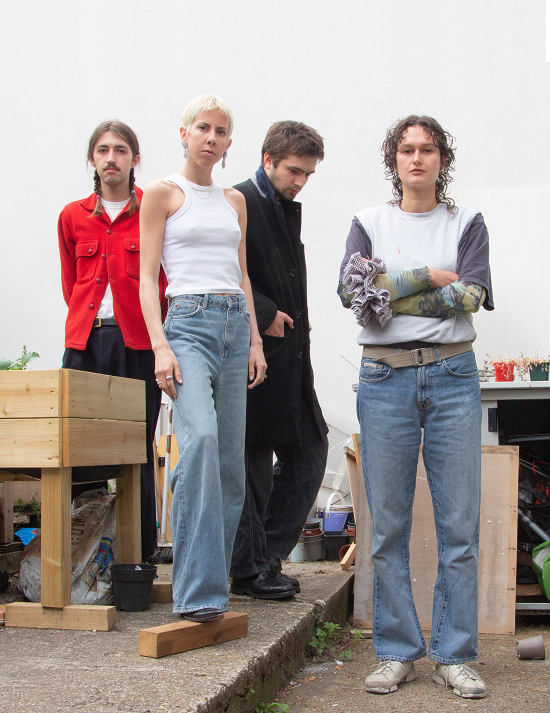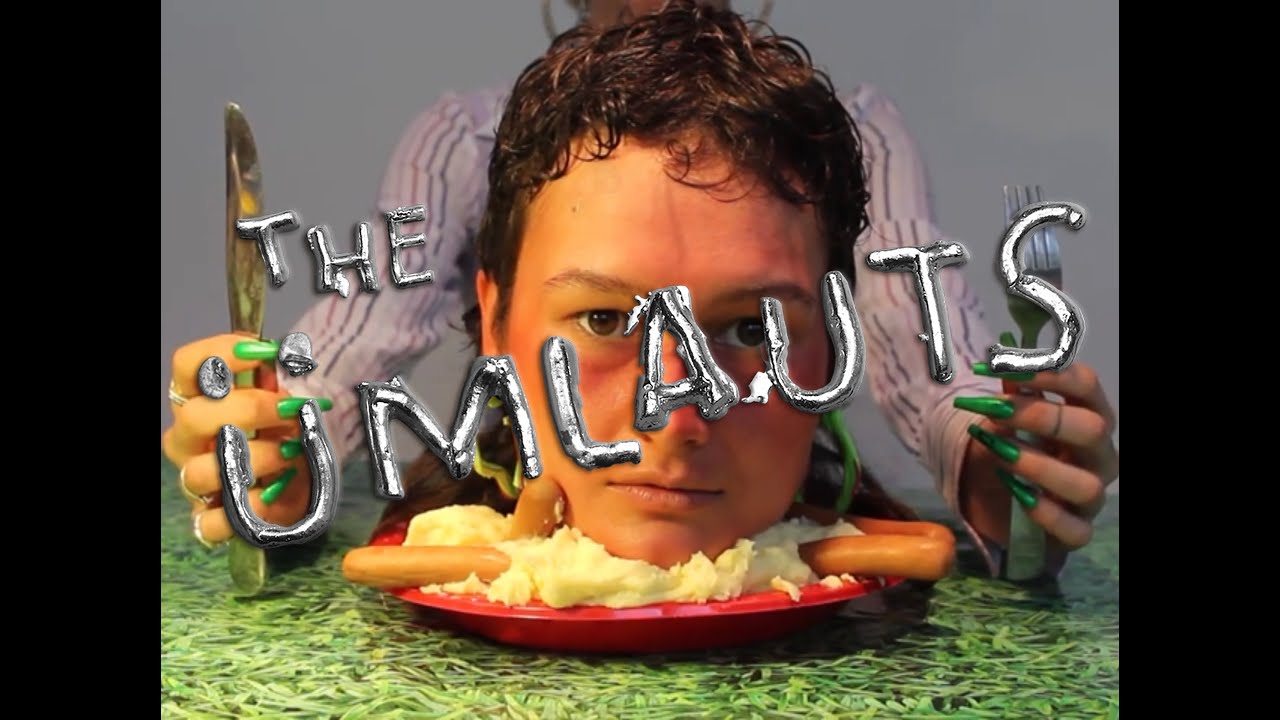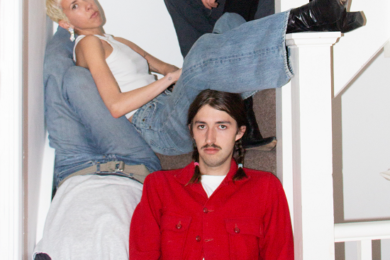The Umlauts are a band whose music does a lot of things. Their name in itself, and the titular refrain of debut single ‘Boiler Suits And Combat Boots’, is like a deconstruction of the cliches of Euro-fetishising pop, but there is substance to their style that moves them well beyond the realms of parody. Between them dual vocalists Annabelle Mödlinger and Maria Vittoria Faldini speak French, German, Italian and English, and they breeze from one language to another over the expansive beats of bandmates Oliver Offord and Alf Lear. The craft behind their songs is substantial too, there’s obvious attention spent on the fine details and the subtle turns in momentum that make a good pop song great, and they draw deeply from broader cultural conversations; inspirations on their forthcoming EP include the sound of an organ being tuned in a Ghent cathedral, Giovanni Lindo Ferretti of Italian punks CCCP Fedeli Alla Linea’s ode to his dead father, haunted nightclubs and Doris Day. It is the way they are able to weave their irreverent and artistic streaks together that makes them special.
Interviewing The Umlauts over two conversations – the first in the beer garden of their local South London pub shortly after the release of their first EP Ü in September 2021 and the second over Zoom the following June as they gear up to release its follow up Another Fact – the band are excellent company. That irreverent streak is clear in conversation too as they poke gentle fun at one another, as they reminisce about their chaotic early days as students (“4am is not the time to start a mariachi band,” read one note left by an exasperated next door neighbour). During the first interview in particular they enjoy a collective dumbfoundedness that things have taken off the way they have. “None of this was really planned,” says Mödlinger. “But that’s what makes it really fun, that it’s a joke that’s got out of hand.”
The Umlauts were, in fact, originally the offshoot of a fake label called Gut Rock Recordings ‘set up’ in the minds of Offord and Lear when they were painting students at Wimbledon College Of Arts. The two had grown up together in the Gloucestershire market town of Stroud and become friends with Mödlinger and Faldini at university. One evening as they joked around about their fictional label, “we thought that it would be funny to start a kind of techno-ish band called The Umlauts,” Offord recalls. “It was obvious that we’d employ Annabelle with her knowledge of the German language to sing on it.” Half for fun, they came up with a pumping demo instrumental and the line ‘Boiler Suits And Combat Boots’. Then they approached Faldini for another song called ‘Energy Plan’, a wonkier and pushier single than the first. She and Mödlinger, too, had been dreaming up a fictional music career. “We were always around when the guys were making music together, and kind of as a joke we were like ‘we should start an all-girl band,’” Faldini says. “We ended up talking about it for quite a while even though neither of us can play an instrument. So then when this idea of The Umlauts started it was like… hmm!”
“There wasn’t any point where we sat together and said, ‘now we’re a band,’” says Faldini, but the band would swiftly move from fiction into fact. One day, a friend of Mödlinger’s congratulated her on her record deal and she assumed he was making fun of her. “He must have thought it was so rude! It was only the next day somebody else was like, ‘no, that is real, that’s actually happened!’” She was unaware that Stephen Bass of the label PRAH had come across ‘Boiler Suits’, and had in turn offered The Umlauts some recording time in their Margate studio. ‘Boiler Suits’ came out properly as their first single at the beginning of 2021, which Mödlinger now views as “the proper birthing date for the band, where it started to feel like ‘this is going to happen.’”
That said, from their earliest stages the band were considering the wider implications of their music. Mödlinger and Faldini were enlisted because they were friends, not because they are both multilingual, but as Lear says, “you use the resources you’ve got.” In the studio, they started to consider their Europeanness beyond the way it fit on the surface level with Lear and Offord’s continental influences. “If you grew up multilingual, sometimes you resort to different languages for different things,” says Mödlinger, who grew up in Austria raised by an English speaking mother and a German speaking father. As Faldini explains, “Italian is a lot softer than French, so if certain lyrics need to be more dreamlike or romantic then I’ll naturally go for that. French used to be my first language but since I’ve been in London for eight years now and don’t have a lot of French speaking friends, it needs a bit more thought, the lyrics need to be longer and more thought through rather than spontaneous as they would be in Italian.” It also allows them to play with the respective benefits of leaving or remaining in their comfort zones. Singing in German, says Mödlinger, “is a really comfortable place” compared to English. “It was a safety cushion where I didn’t have this fear of being super analysed, and I can play around with the idea of people having no idea what I’m saying.”
It’s part of The Umlauts’ appeal that for all of the conversations that can spring from their music, in some ways they still feel a bit like the kind of band you’d imagine in your head – they have the playfulness and unpredictability of a group undaunted by the practical logistics of making good on their fantasies. When he and Offord were messing around on Ableton early on, recalls Lear, “we had no plans of playing the songs live,” meaning they could be as ambitious as they pleased when it came to instrumentation. “When you’re on a computer it’s so fucking easy to play things, you don’t have to be a virtuoso,” says Offord. By the time the full EP was released in June 2021, Britain was only just emerging from its third strict lockdown, so although the songs had been ready for some time, there had been few opportunities for gigs. The fact that they had never really played a show also increased their mystique. “Nobody really knew who we were, it had this mystery to it,” recalls Faldini.
What, then, were they do to when PRAH started pushing them to play live? The answer, pleasingly, was not to scale down their songs but to scale up their live band. Ahead of their first gig, which was to be held at The Brixton Windmill, they started calling up friends. “We needed quite a few helping hands to get it working,” says Lear. They settled on a sprawling and chaotic band, made up of old friends and fellow musicians – drummer Toby Kempner and extra keyboard player Alex Berry are Offord and Lear’s friends from back in Stroud, violinist Magdalena McLean is also in the band caroline and percussionist Freya Tate is a member of Mermaid Chunky (guitarist Patrick Lister completes the line-up). Due to the sheer scale of the operation, membership is flexible, but at its peak The Umlauts is now a nine-piece that has taken on a life of its own. Where their first EP was slick and quick on its feet, onstage they have a kind of giddy power that is entirely organic.
At End Of The Road festival at the close of that summer, The Umlauts as a nine-piece hit a breakthrough – even if McClean did have to sprint from the end of Caroline’s set to the beginning of The Umlauts’, and Berry was found passed out under a pile of clothes in the boot of a car two hours beforehand. “The night before had been chaotic, I was very nervous about the idea of all these sloppy hands on the keys,” recalls Offord. Thanks to the steadying influence of a sound engineer whose possession of a printer in his car resonated a sense of authority, the show ended up being a storming success. Mödlinger remembers it as “one of those turning points where you think, ‘wow’. Playing gigs in the odd venue is obviously amazing, but having so many people watching, and sharing it with so many people.” Faldini remembers an epiphany of sorts onstage. “I play the drum pad on ‘Energy Plan’, the first song we were playing, so it was a bit stressful, and after that track I was feeling a bit nervous. But then I realised that as soon as you smile your whole body reacts to that. I just looked around at the people around me At End Of The Road I looked around at the people around me and thought ‘relax, have fun!’”
The rest of that night defines in microcosm the push and pull between professionalism and chaos that makes The Umlauts great. From End Of The Road they travelled straight to Manchester Psych Fest, where they were set to play at 2.30am. “It ended up being 3.30 because the sound guy was so off his tits!” Faldini laughs. Their show was pure anarchy, “I was just screaming ‘I can’t hear a fucking thing!’ the entire time,” she remembers. One inebriated punter decided to give them a real-time review as the show progressed, tapping Mödlinger on the shoulder to offer feedback as she tried to sing.
It’s only a few weeks after those shows that the band and I are having our first conversation, towards the end of which talk naturally turns to what’s next. They’re putting the finishing touches on their second EP, about which they’re clearly excited. “It feels to me like we’re flexing our muscles and exploring as much as possible,” says Lear. “I think we’ve been speaking about it more in terms of orchestral terms,” says Offord. “It’s got a more grandiose feel to it.” Faldini speaks excitedly about bringing in more of her personal influences; “I’ve introduced a lot of ‘70s Italian pop and French rap.” They have been grappling with a song affectionately nicknamed ‘the song with the existential crisis’ due to the amount of changes it’s been through, and hope to finally give it a proper release. “All we’ve got to do is polish it up and roll it in glitter,” says Offord.

When the band and I speak again, some ten months later, it’s telling what has changed and what hasn’t about Another Fact. McLean is employed regularly on violin, adding plenty of that dramatic orchestral sweep that Offord was talking about. The song with the existential crisis is now the closing title track, a slow-burning seven-minute epic. Yet what’s most apparent is how the band’s ambition has continued to stretch. They describe opening track ‘The Quickening’, which is based around a field recording Offord made of an organ being tuned in Bruges, as a “palate cleanser” between the two releases, so that the increased scope of what follows can be properly framed.
If on Ü, the implications of the group’s use of different languages was an interesting offshoot, on Another Fact it’s explored in depth. On ‘Frightened’, which began life as an attempted cover of The Fall’s song of the same name but ended up mutating into a pumping synth pop melodrama, the song is divided into two segments, one with Faldini singing in French, the other with Mödlinger singing in German. The two are presented as the warring voices in an argument, hurling insults and rebuttals at one another across the language barrier – all that goes lost in translation between them serving as a metaphor for what two people can never understand about one another.
What they thought was going to be a quick trip back to PRAH’s Margate studio to add overdubs and re-record a few vocals a few weeks after our first interview ended up being anything but simple. “We realised ‘wow, there is just so much more to explore,’” says Offord. “They spent an “arduous” additional week working “all day and all night,” the weather outside at its bleakest. They cite that as an influence on the record’s darker qualities, synths that hit like percussion, violins that sweep with mournful fragility, and vocals often delivered with icy detachment. “It’s got a real kind of weighty heaviness to it,” says Offord. Adds Faldini, “I really think that it would sound completely different if we’d finished recording it on the summer.”
“On this EP everybody has found their little nook a little bit more,” Mödlinger says. The first time around, she admits, “I had massive imposter syndrome because I’d never done music before.” Faldini agrees, “there was a period where every week one of us would have a conversation like, ‘Am I really useful in the band? Why am I here? I don’t really give anything at the moment.’ It was very stressful and intense at the beginning, actually. But now I feel like everyone’s understood that it’s OK if you don’t work as much as someone else for a few weeks.” That’s even truer when it comes to the nine-piece live band,” says Offord. “There’s so many different ideas to negotiate. You have to just release your control to the dynamic of collaboration rather than just push forward with one idea.”
After their time in Margate, Faldini and Mödlinger took some time to travel back to Italy and Austria respectively, while Offord and Lear spent two months mixing the record and rehearsing with the extended live band. “It was nice to take the time away because it was such a long process to get these six tracks that it felt like it needed to be reflected on a little bit,” Offord says. “Also, we’d been gigging quite a lot and we needed to gather ourselves and figure out what we’re going to do next.”
The immediate future now brings the excitement of live shows, with a band that are now finely-tuned – “we’re really hitting our stride now,” says Offord with conviction – but still in possession of that essential spontaneity that has always made The Umlauts so engaging. “Admittedly we have a slightly hedonistic amount of band members, but its important for us to play with a group of people, rather than just be like, ‘here I am, the guy at the back triggering pads.” Back in our first chat, Faldini noted that “we always tell ourselves not to forget the humorous side of The Umlauts, because that’s what created us. It’s important to keep the fun going.” When we speak again almost a year later, though a lot has changed for the band that sentiment clearly remains fundamental. For that reason alone, the band’s future is bright.
The Umlauts’ new EP Another Fact is released on October 14 via PRAH




